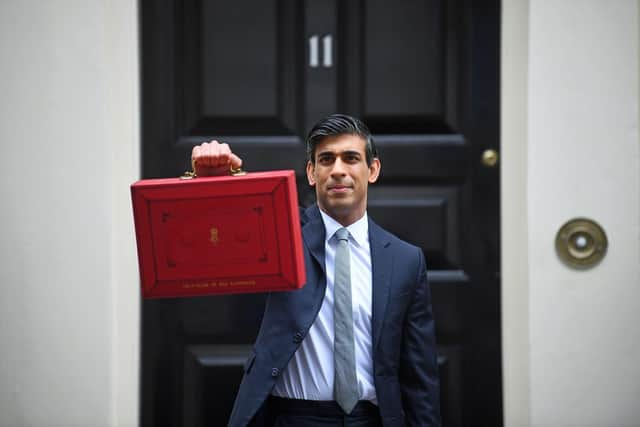Lancashire business leaders braced for Budget balancing act
and live on Freeview channel 276
Business are battling to cope with rising taxes, massive debt thanks to the coronavirus pandemic, a skills and staff shortage and soaring inflation and energy and fuel prices all underpinned by Brexit red tape and set in the light of action to tackle the climate crisis.
Lancashire business leaders say this will be a crucial speech from the Chancellor and all eyes are on how he will deliver the Government’s “high wage, high skill, high productivity” mantra.
Advertisement
Hide AdAdvertisement
Hide AdMatthew Johnson, associate partner at accountants and business advisors WNJ, based in Ferry Road, near Preston Dock, said the list of pressures could make it hard for everyone.


He said: “Chancellor Rishi Sunak has a delicate balancing act to perform when he stands up to give his Autumn Budget speech on October 27.
“The government is committed to 'high wage, high skill, high productivity'. And with calls for more action on the national minimum wage, which increased in the March Budget, we may see another rise for workers aged 23 and over.
“There have been reports it could increase by as much as five per cent from its current £8.91 an hour rate.
Advertisement
Hide AdAdvertisement
Hide Ad“Despite the chancellor’s publicly stated desire to cut taxes it is very unlikely that we will see that happen in this Budget.


“At the same time an increase in income tax or movement or national insurance is not seen to be on the agenda.
“Business is still assessing the impact of the September announcement that national insurance contributions and dividend tax rates will increase by 1.25 per cent from April 2022, with the projected £12bn annual income ringfenced to pay for health and social care.
“That followed the chancellor’s March announcement of an increase in Corporation Tax from 2023, with a new rate of 25 per cent.
Advertisement
Hide AdAdvertisement
Hide Ad“It came with plans to create a ‘Small Profits Rate’, for companies with profits of less than £50,000, which will be kept at the current 19 per cent level.


“There is speculation that Capital Gains Tax could rise on October 27, with rates aligned more with income tax rates.
“However, Inheritance Tax rates are set to remain unchanged and with the soaring cost of fuel and recent shortages at the pumps, a fuel duty increase is also seen as unlikely.
“Any increase on alcohol duty would have a detrimental impact on the hospitality industry, one of the worst impacted by the pandemic, as it looks towards its recovery.
Advertisement
Hide AdAdvertisement
Hide Ad“Businesses would like to see some movement on Business Rates, which are having a dramatic impact on the high street, with retailers in particular calling for action.
“It may be the chancellor feels he has to make some move, especially to aid smaller ventures. The same goes for support for business growth.”
Patrick King, partner at MHA, says the Chancellor may still defy expectations and decide bold changes to the tax system are needed to plug the hole in the government’s finances:
He said: “The consensus is that Rishi Sunak will give us a ‘technical’ budget, shorn of big, headline grabbing tax changes.
Advertisement
Hide AdAdvertisement
Hide Ad“Yet the Chancellor is also in a tough spot. He needs to raise more taxes if he is to avoid slashing public spending.
“He also has a boss keen on his ‘levelling up’ agenda, a potentially huge and growing cost to de-carbonise and the need to ensure business is incentivised to stay in the UK post Brexit.
“To raise money he could finally grasp the nettle of removing higher rate relief on pension contributions. This would bridge the alleged inequality gap that exists with over half of all pension tax relief currently being received by the top 10 per cent of earners.
“The measure would be an efficient revenue-raiser, bringing in billions to the Treasury and perhaps not as unpopular as some tax measures since relatively few will lose out.
Advertisement
Hide AdAdvertisement
Hide Ad“Clearly the Chancellor can’t afford too much in the way of tax relief but if he is serious about encouraging take up of electric vehicles, why not cut VAT on them?”
Mike Cherry from the Lancashire-based Federation of Small Businesses said it was vital the Chancellor brought in measures to boost small firms ability to recover and employ.
He said: “Expanding the Small Business Rates Relief to a rateable value of £25,000, removing hundreds of thousands of small firms from the scope of this tax, would make a huge difference to small firms in these regions.”
He also suggested increasing the Employment Allowance, saving small businesses £5,000 rather than £4,000 on their annual jobs tax bills, and helping them invest in their staff themselves.
Advertisement
Hide AdAdvertisement
Hide AdBut he welcomed moves to help pupils with their maths skills.
He said: “It’s good to see a new focus on improving skills like numeracy and literacy. “These are the skills that people need to be equipped with to be successful in today’s tough jobs market, and we know those furthest from work often struggle with maths.
"It’s crucial that at every age people have the opportunity to pick up new skills that they might not have learned in school. Many businesses are currently struggling to fill vacancies in sectors like hospitality and this will help by expanding the potential pool of those eligible.
"After being equipped with these vital skills, we know small employers are excellent at providing opportunities and further upskilling. With funding being distributed through the UK Shared Prosperity Fund, it’s critical that small firms are at the front and centre of this.”